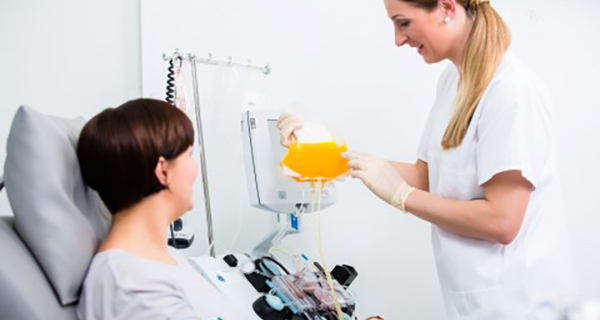Since you’re reading this article, you’re likely thinking about making a plasma donation. Good for you! In this blog, we answer your questions about how plasma donation works, how it helps patients, and, of course, is donating plasma safe?
Is donating plasma safe?
Let’s start with the last question first: Is donating plasma safe? The simple answer is yes. Vitalant collects all donations using a process that ensures every donation is safe for you and the patients who receive your donation.
Our blood donation process includes a review of your health history and a mini-physical. Once you are settled into one of our comfy donation chairs, staff open a sterile one-time-use kit to collect your plasma using a special machine. The plasma is removed from your blood and the other components (red blood cells and platelets) are returned to you, along with refreshing saline solution. You may feel a bit chilly from the saline, but our staff will be happy to provide a blanket if this happens.
After your donation, stick around to rehydrate and indulge in free snacks for about 15 minutes. The entire plasma donation process, from the time you walk in until you leave, takes 1.5 to 2 hours. Use the time to catch up on emails, read or even watch a show!
How does plasma donation help patients?
Plasma, the liquid portion of your blood, is essential to good health: It makes up 95% of your blood volume and carries all the other parts of your blood. Plasma transfusions are vital for patients with severe burns, or those who experience massive blood loss during childbirth or from serious trauma like a motor vehicle accident or gunshot wound.
You can donate plasma no matter your blood type, but people with type AB blood are especially encouraged to donate plasma. Type AB (positive and negative) is the universal plasma donor, meaning your plasma can be given to any patient, regardless of their blood type.
Plasma can be donated every 28 days, up to 13 times a year — twice as often as you can donate whole blood. When you donate plasma as often as possible, you help more patients and ensure it’s available when those trauma patients come in and need it STAT.
Will I get paid for my plasma donation?
All blood donations at Vitalant are voluntary. As a nonprofit organization, Vitalant is focused primarily on collecting and providing hospitals with blood products like plasma that can be used for patient transfusion. Most U.S. hospitals have policies against transfusing blood from paid donors. When you donate plasma at for-profit organizations that pay donors, your plasma does not go directly to patients. That plasma is processed and used to make pharmaceuticals.
When you donate plasma with Vitalant, you can feel good about directly saving the lives of hospital patients who urgently need plasma. We periodically offer donors gifts as our way of saying thanks. And all donors are encouraged to join our donor recognition program, where you can receive rewards including gift cards from major retailers. The more times you donate, the greater the rewards.

